Pharmacology of Opioids: Safe Administration and Concerns Report
VerifiedAdded on 2022/11/30
|7
|1283
|293
Report
AI Summary
This report, prepared by a student, delves into the pharmacology of opioids, emphasizing the importance of safe medication administration within the context of nursing practice. It outlines key pharmacological concepts such as pharmacokinetics, pharmacodynamics, and pharmacogenomics, providing a foundation for understanding drug actions and effects. The report highlights the principles of safe medication administration, referencing the College of Nurses of Ontario (CNO) practice standards, and addresses nurses' concerns regarding opioid use, particularly concerning addiction issues in various patient populations, including those with cancer, rheumatoid arthritis, and neuropathic pain. Furthermore, it identifies common errors associated with opioid administration, such as dosage errors and incorrect administration routes. The report underscores the need for nurses to be knowledgeable about the risks and benefits of opioid use and to educate patients accordingly, ensuring adherence to safe practices and minimizing potential adverse outcomes.
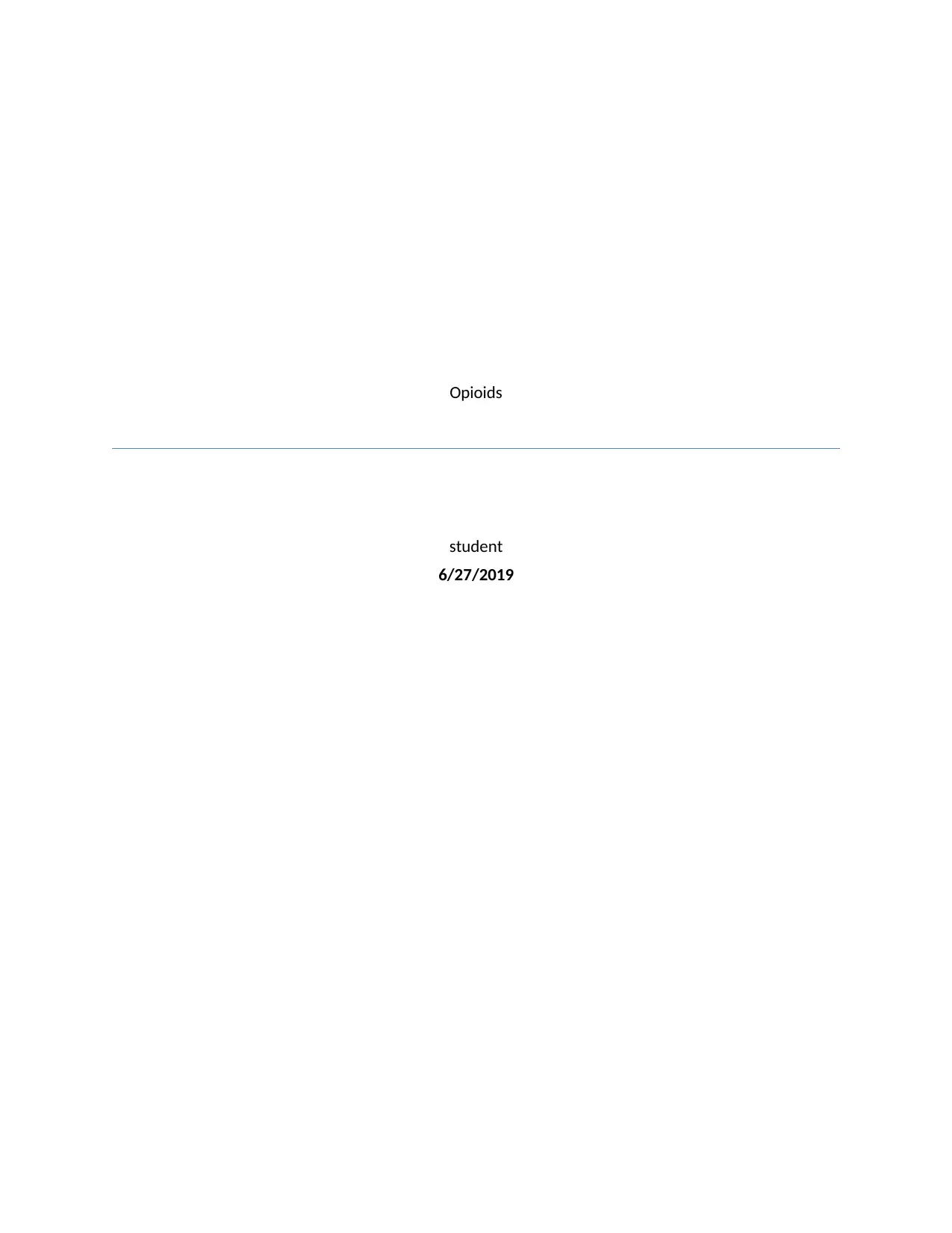
Opioids
student
6/27/2019
student
6/27/2019
Paraphrase This Document
Need a fresh take? Get an instant paraphrase of this document with our AI Paraphraser
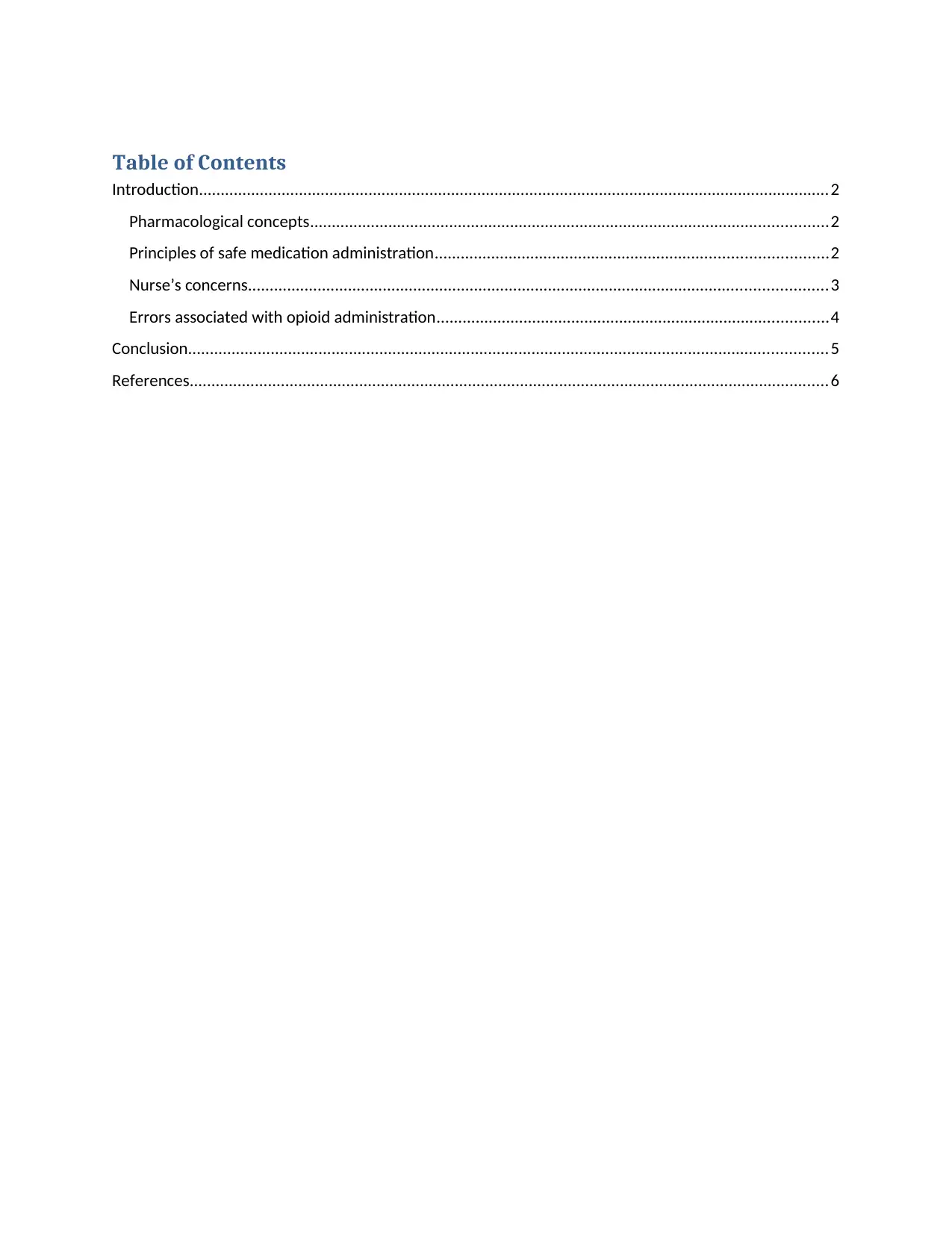
Table of Contents
Introduction.................................................................................................................................................2
Pharmacological concepts.......................................................................................................................2
Principles of safe medication administration..........................................................................................2
Nurse’s concerns.....................................................................................................................................3
Errors associated with opioid administration..........................................................................................4
Conclusion...................................................................................................................................................5
References...................................................................................................................................................6
Introduction.................................................................................................................................................2
Pharmacological concepts.......................................................................................................................2
Principles of safe medication administration..........................................................................................2
Nurse’s concerns.....................................................................................................................................3
Errors associated with opioid administration..........................................................................................4
Conclusion...................................................................................................................................................5
References...................................................................................................................................................6
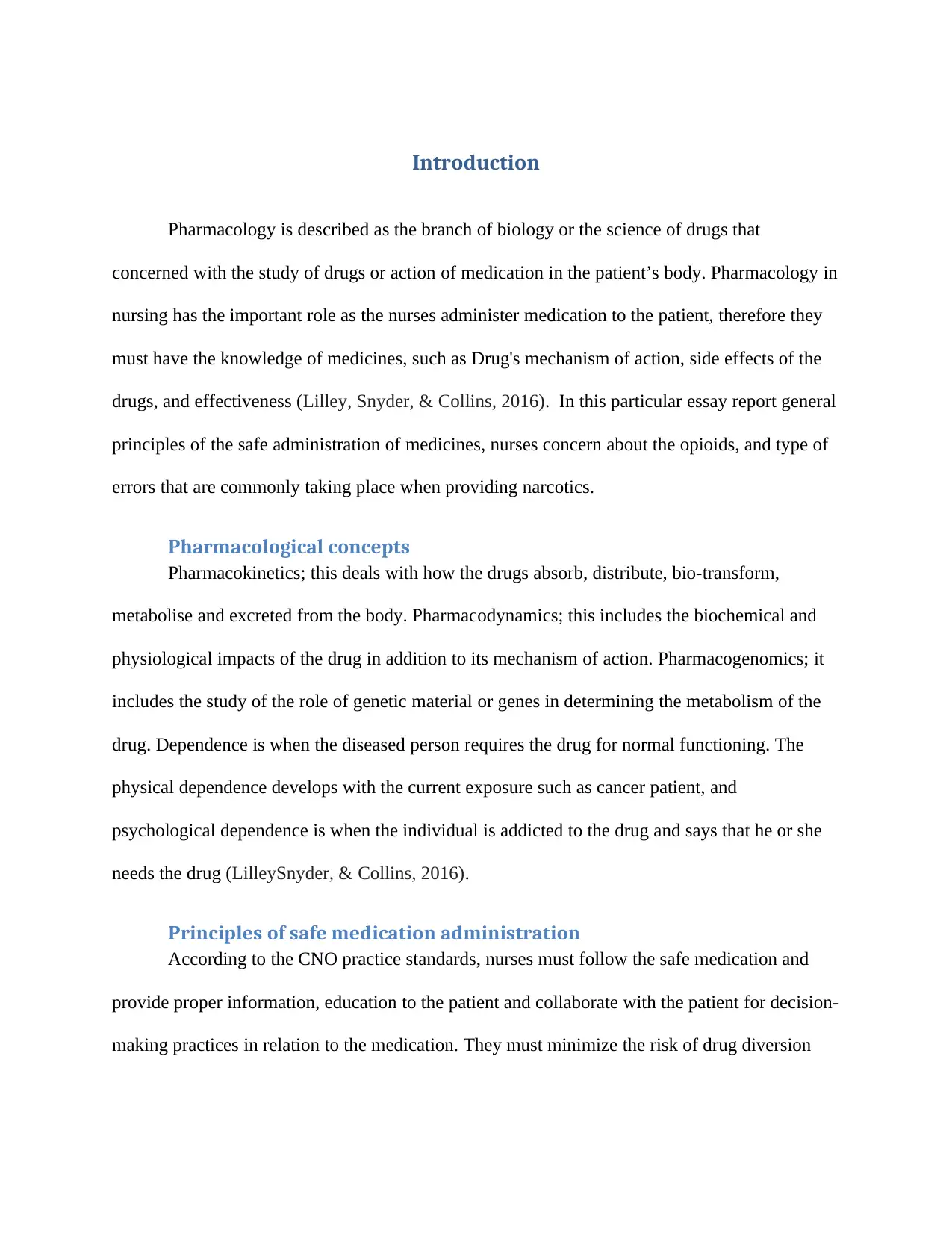
Introduction
Pharmacology is described as the branch of biology or the science of drugs that
concerned with the study of drugs or action of medication in the patient’s body. Pharmacology in
nursing has the important role as the nurses administer medication to the patient, therefore they
must have the knowledge of medicines, such as Drug's mechanism of action, side effects of the
drugs, and effectiveness (Lilley, Snyder, & Collins, 2016). In this particular essay report general
principles of the safe administration of medicines, nurses concern about the opioids, and type of
errors that are commonly taking place when providing narcotics.
Pharmacological concepts
Pharmacokinetics; this deals with how the drugs absorb, distribute, bio-transform,
metabolise and excreted from the body. Pharmacodynamics; this includes the biochemical and
physiological impacts of the drug in addition to its mechanism of action. Pharmacogenomics; it
includes the study of the role of genetic material or genes in determining the metabolism of the
drug. Dependence is when the diseased person requires the drug for normal functioning. The
physical dependence develops with the current exposure such as cancer patient, and
psychological dependence is when the individual is addicted to the drug and says that he or she
needs the drug (LilleySnyder, & Collins, 2016).
Principles of safe medication administration
According to the CNO practice standards, nurses must follow the safe medication and
provide proper information, education to the patient and collaborate with the patient for decision-
making practices in relation to the medication. They must minimize the risk of drug diversion
Pharmacology is described as the branch of biology or the science of drugs that
concerned with the study of drugs or action of medication in the patient’s body. Pharmacology in
nursing has the important role as the nurses administer medication to the patient, therefore they
must have the knowledge of medicines, such as Drug's mechanism of action, side effects of the
drugs, and effectiveness (Lilley, Snyder, & Collins, 2016). In this particular essay report general
principles of the safe administration of medicines, nurses concern about the opioids, and type of
errors that are commonly taking place when providing narcotics.
Pharmacological concepts
Pharmacokinetics; this deals with how the drugs absorb, distribute, bio-transform,
metabolise and excreted from the body. Pharmacodynamics; this includes the biochemical and
physiological impacts of the drug in addition to its mechanism of action. Pharmacogenomics; it
includes the study of the role of genetic material or genes in determining the metabolism of the
drug. Dependence is when the diseased person requires the drug for normal functioning. The
physical dependence develops with the current exposure such as cancer patient, and
psychological dependence is when the individual is addicted to the drug and says that he or she
needs the drug (LilleySnyder, & Collins, 2016).
Principles of safe medication administration
According to the CNO practice standards, nurses must follow the safe medication and
provide proper information, education to the patient and collaborate with the patient for decision-
making practices in relation to the medication. They must minimize the risk of drug diversion
⊘ This is a preview!⊘
Do you want full access?
Subscribe today to unlock all pages.

Trusted by 1+ million students worldwide
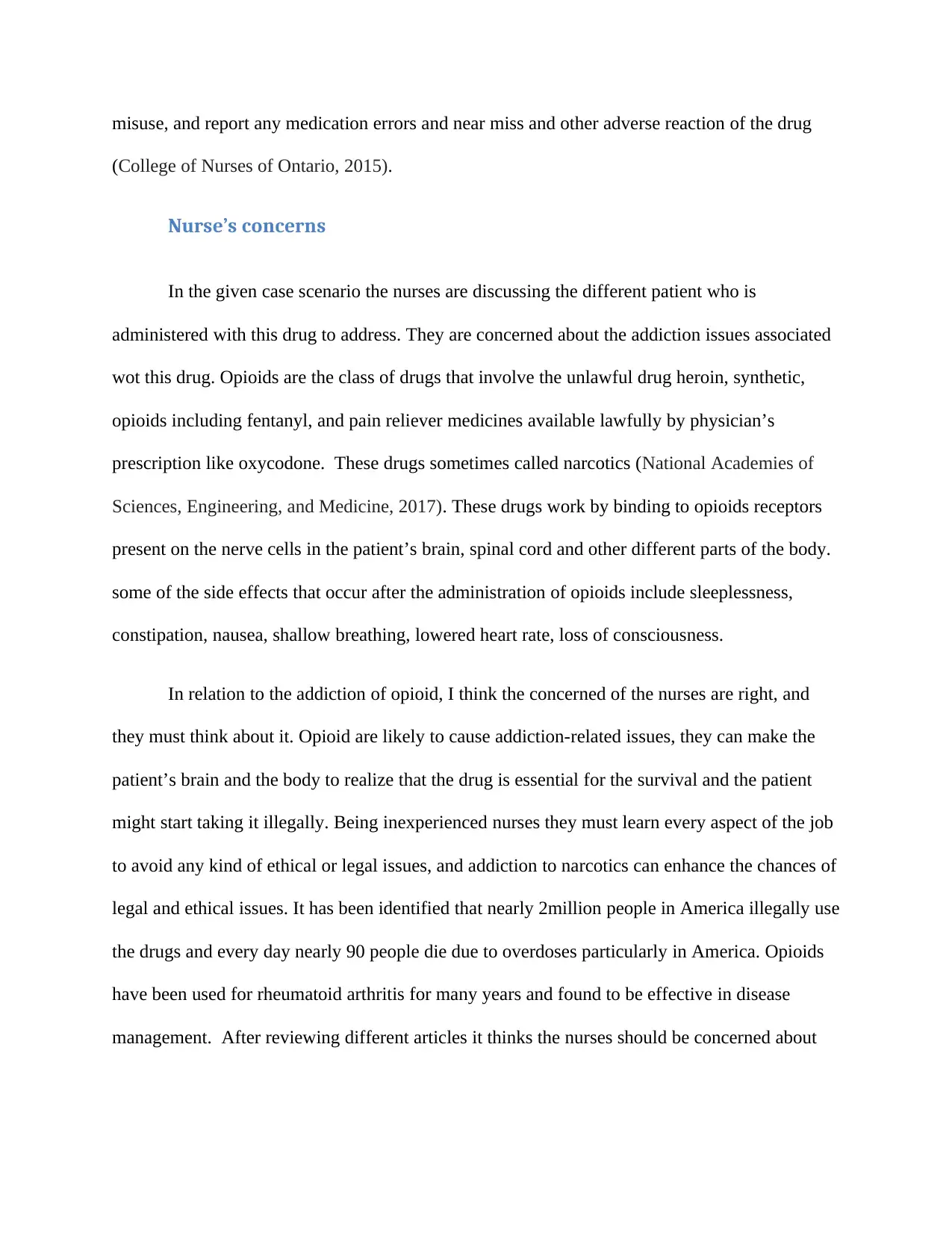
misuse, and report any medication errors and near miss and other adverse reaction of the drug
(College of Nurses of Ontario, 2015).
Nurse’s concerns
In the given case scenario the nurses are discussing the different patient who is
administered with this drug to address. They are concerned about the addiction issues associated
wot this drug. Opioids are the class of drugs that involve the unlawful drug heroin, synthetic,
opioids including fentanyl, and pain reliever medicines available lawfully by physician’s
prescription like oxycodone. These drugs sometimes called narcotics (National Academies of
Sciences, Engineering, and Medicine, 2017). These drugs work by binding to opioids receptors
present on the nerve cells in the patient’s brain, spinal cord and other different parts of the body.
some of the side effects that occur after the administration of opioids include sleeplessness,
constipation, nausea, shallow breathing, lowered heart rate, loss of consciousness.
In relation to the addiction of opioid, I think the concerned of the nurses are right, and
they must think about it. Opioid are likely to cause addiction-related issues, they can make the
patient’s brain and the body to realize that the drug is essential for the survival and the patient
might start taking it illegally. Being inexperienced nurses they must learn every aspect of the job
to avoid any kind of ethical or legal issues, and addiction to narcotics can enhance the chances of
legal and ethical issues. It has been identified that nearly 2million people in America illegally use
the drugs and every day nearly 90 people die due to overdoses particularly in America. Opioids
have been used for rheumatoid arthritis for many years and found to be effective in disease
management. After reviewing different articles it thinks the nurses should be concerned about
(College of Nurses of Ontario, 2015).
Nurse’s concerns
In the given case scenario the nurses are discussing the different patient who is
administered with this drug to address. They are concerned about the addiction issues associated
wot this drug. Opioids are the class of drugs that involve the unlawful drug heroin, synthetic,
opioids including fentanyl, and pain reliever medicines available lawfully by physician’s
prescription like oxycodone. These drugs sometimes called narcotics (National Academies of
Sciences, Engineering, and Medicine, 2017). These drugs work by binding to opioids receptors
present on the nerve cells in the patient’s brain, spinal cord and other different parts of the body.
some of the side effects that occur after the administration of opioids include sleeplessness,
constipation, nausea, shallow breathing, lowered heart rate, loss of consciousness.
In relation to the addiction of opioid, I think the concerned of the nurses are right, and
they must think about it. Opioid are likely to cause addiction-related issues, they can make the
patient’s brain and the body to realize that the drug is essential for the survival and the patient
might start taking it illegally. Being inexperienced nurses they must learn every aspect of the job
to avoid any kind of ethical or legal issues, and addiction to narcotics can enhance the chances of
legal and ethical issues. It has been identified that nearly 2million people in America illegally use
the drugs and every day nearly 90 people die due to overdoses particularly in America. Opioids
have been used for rheumatoid arthritis for many years and found to be effective in disease
management. After reviewing different articles it thinks the nurses should be concerned about
Paraphrase This Document
Need a fresh take? Get an instant paraphrase of this document with our AI Paraphraser
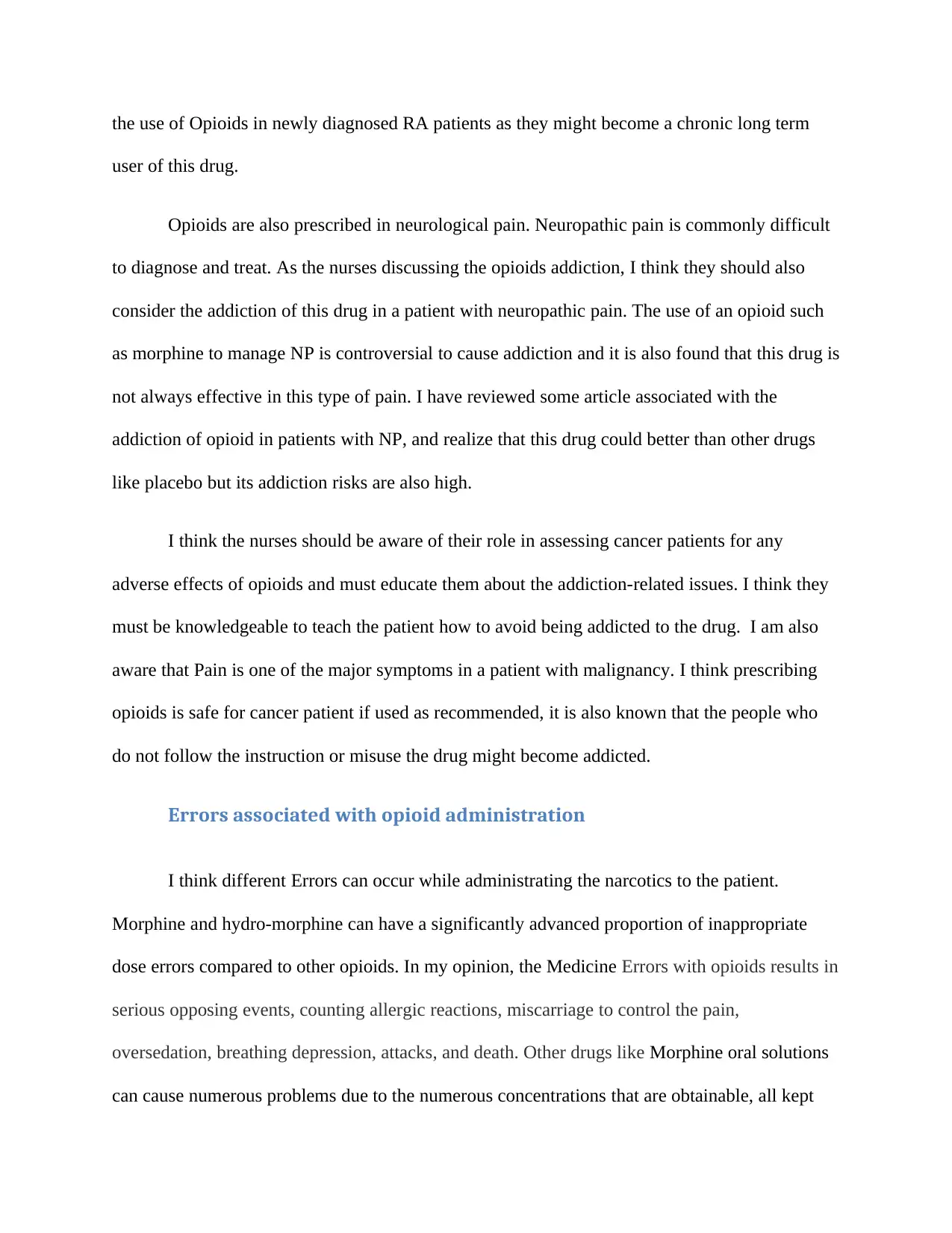
the use of Opioids in newly diagnosed RA patients as they might become a chronic long term
user of this drug.
Opioids are also prescribed in neurological pain. Neuropathic pain is commonly difficult
to diagnose and treat. As the nurses discussing the opioids addiction, I think they should also
consider the addiction of this drug in a patient with neuropathic pain. The use of an opioid such
as morphine to manage NP is controversial to cause addiction and it is also found that this drug is
not always effective in this type of pain. I have reviewed some article associated with the
addiction of opioid in patients with NP, and realize that this drug could better than other drugs
like placebo but its addiction risks are also high.
I think the nurses should be aware of their role in assessing cancer patients for any
adverse effects of opioids and must educate them about the addiction-related issues. I think they
must be knowledgeable to teach the patient how to avoid being addicted to the drug. I am also
aware that Pain is one of the major symptoms in a patient with malignancy. I think prescribing
opioids is safe for cancer patient if used as recommended, it is also known that the people who
do not follow the instruction or misuse the drug might become addicted.
Errors associated with opioid administration
I think different Errors can occur while administrating the narcotics to the patient.
Morphine and hydro-morphine can have a significantly advanced proportion of inappropriate
dose errors compared to other opioids. In my opinion, the Medicine Errors with opioids results in
serious opposing events, counting allergic reactions, miscarriage to control the pain,
oversedation, breathing depression, attacks, and death. Other drugs like Morphine oral solutions
can cause numerous problems due to the numerous concentrations that are obtainable, all kept
user of this drug.
Opioids are also prescribed in neurological pain. Neuropathic pain is commonly difficult
to diagnose and treat. As the nurses discussing the opioids addiction, I think they should also
consider the addiction of this drug in a patient with neuropathic pain. The use of an opioid such
as morphine to manage NP is controversial to cause addiction and it is also found that this drug is
not always effective in this type of pain. I have reviewed some article associated with the
addiction of opioid in patients with NP, and realize that this drug could better than other drugs
like placebo but its addiction risks are also high.
I think the nurses should be aware of their role in assessing cancer patients for any
adverse effects of opioids and must educate them about the addiction-related issues. I think they
must be knowledgeable to teach the patient how to avoid being addicted to the drug. I am also
aware that Pain is one of the major symptoms in a patient with malignancy. I think prescribing
opioids is safe for cancer patient if used as recommended, it is also known that the people who
do not follow the instruction or misuse the drug might become addicted.
Errors associated with opioid administration
I think different Errors can occur while administrating the narcotics to the patient.
Morphine and hydro-morphine can have a significantly advanced proportion of inappropriate
dose errors compared to other opioids. In my opinion, the Medicine Errors with opioids results in
serious opposing events, counting allergic reactions, miscarriage to control the pain,
oversedation, breathing depression, attacks, and death. Other drugs like Morphine oral solutions
can cause numerous problems due to the numerous concentrations that are obtainable, all kept
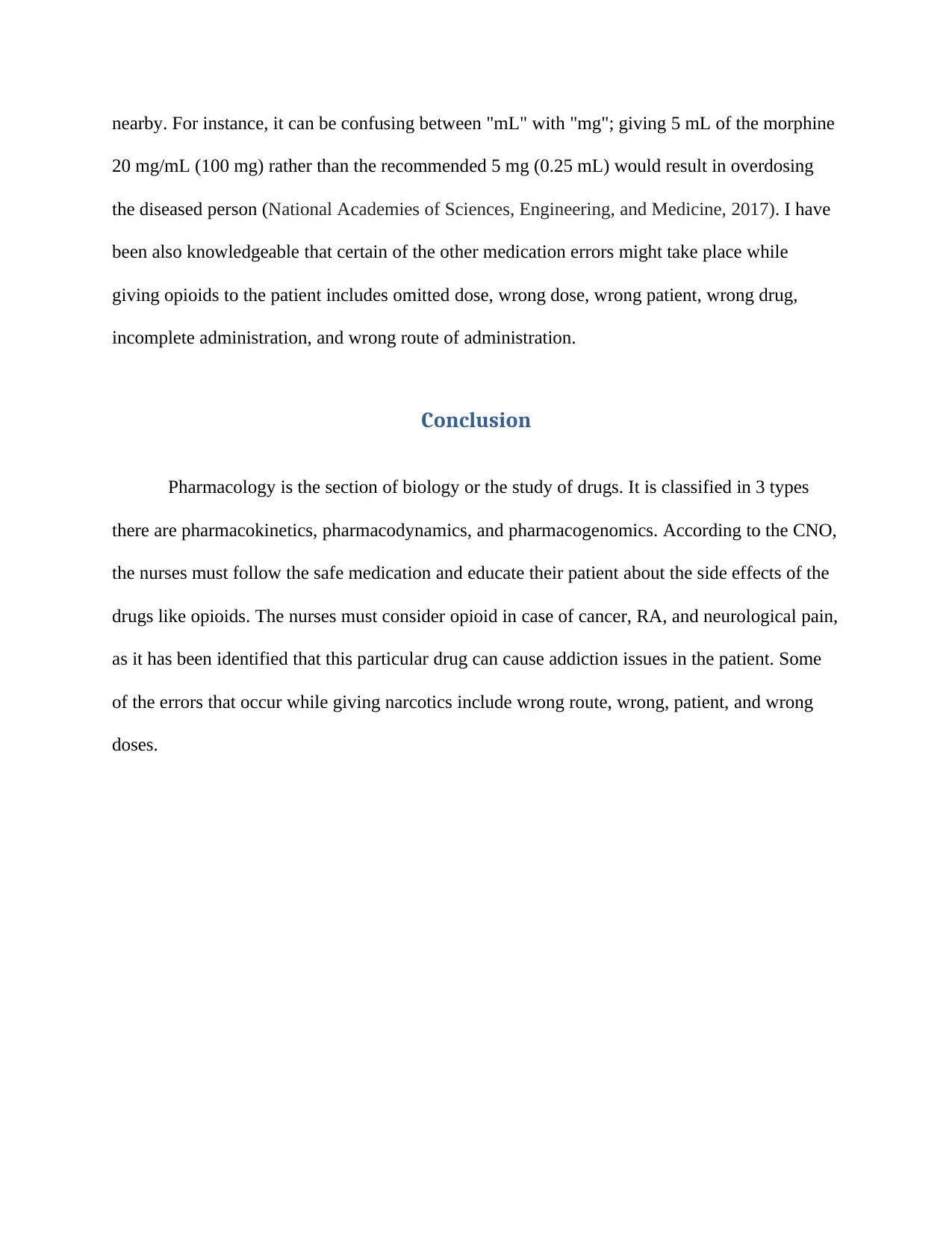
nearby. For instance, it can be confusing between "mL" with "mg"; giving 5 mL of the morphine
20 mg/mL (100 mg) rather than the recommended 5 mg (0.25 mL) would result in overdosing
the diseased person (National Academies of Sciences, Engineering, and Medicine, 2017). I have
been also knowledgeable that certain of the other medication errors might take place while
giving opioids to the patient includes omitted dose, wrong dose, wrong patient, wrong drug,
incomplete administration, and wrong route of administration.
Conclusion
Pharmacology is the section of biology or the study of drugs. It is classified in 3 types
there are pharmacokinetics, pharmacodynamics, and pharmacogenomics. According to the CNO,
the nurses must follow the safe medication and educate their patient about the side effects of the
drugs like opioids. The nurses must consider opioid in case of cancer, RA, and neurological pain,
as it has been identified that this particular drug can cause addiction issues in the patient. Some
of the errors that occur while giving narcotics include wrong route, wrong, patient, and wrong
doses.
20 mg/mL (100 mg) rather than the recommended 5 mg (0.25 mL) would result in overdosing
the diseased person (National Academies of Sciences, Engineering, and Medicine, 2017). I have
been also knowledgeable that certain of the other medication errors might take place while
giving opioids to the patient includes omitted dose, wrong dose, wrong patient, wrong drug,
incomplete administration, and wrong route of administration.
Conclusion
Pharmacology is the section of biology or the study of drugs. It is classified in 3 types
there are pharmacokinetics, pharmacodynamics, and pharmacogenomics. According to the CNO,
the nurses must follow the safe medication and educate their patient about the side effects of the
drugs like opioids. The nurses must consider opioid in case of cancer, RA, and neurological pain,
as it has been identified that this particular drug can cause addiction issues in the patient. Some
of the errors that occur while giving narcotics include wrong route, wrong, patient, and wrong
doses.
⊘ This is a preview!⊘
Do you want full access?
Subscribe today to unlock all pages.

Trusted by 1+ million students worldwide
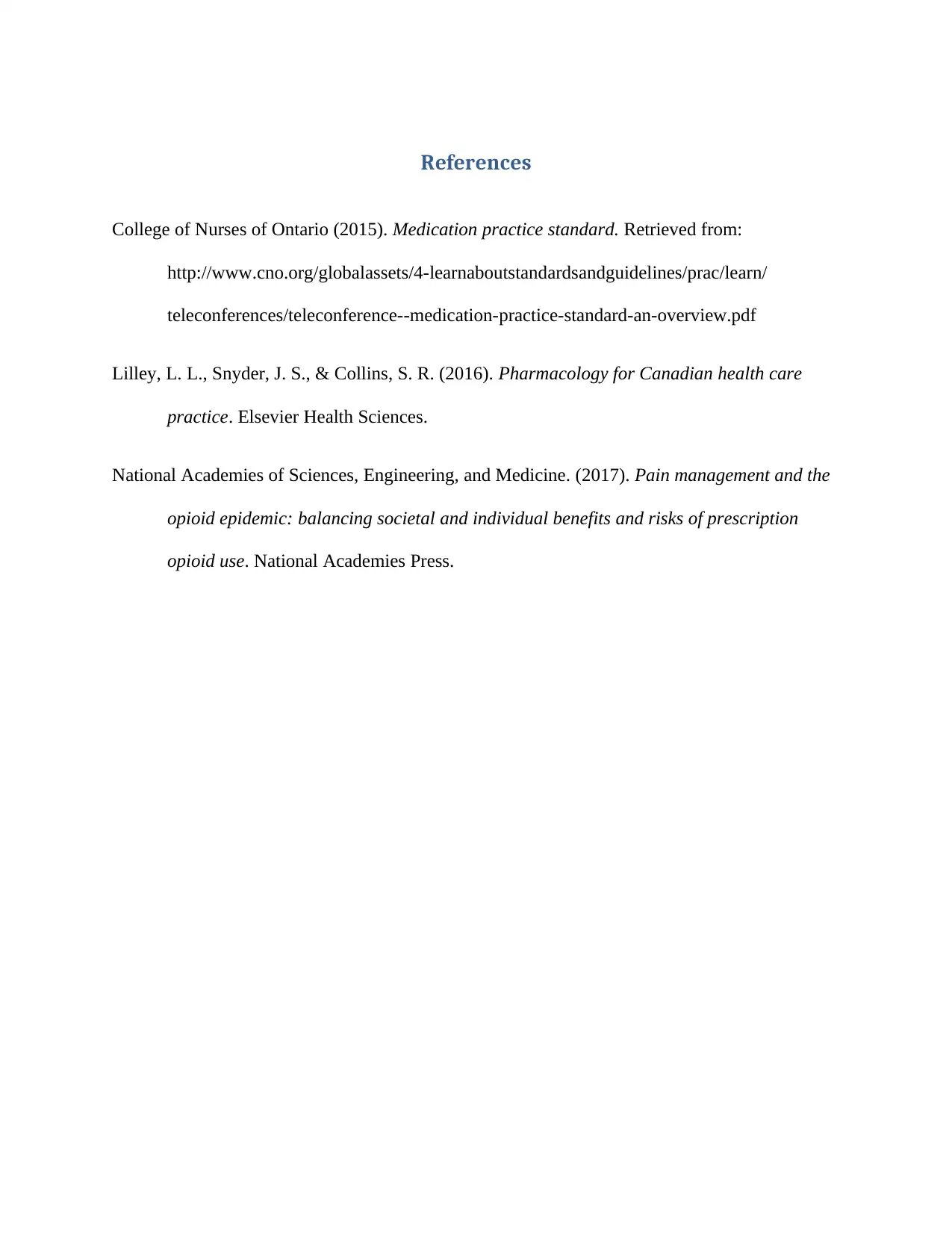
References
College of Nurses of Ontario (2015). Medication practice standard. Retrieved from:
http://www.cno.org/globalassets/4-learnaboutstandardsandguidelines/prac/learn/
teleconferences/teleconference--medication-practice-standard-an-overview.pdf
Lilley, L. L., Snyder, J. S., & Collins, S. R. (2016). Pharmacology for Canadian health care
practice. Elsevier Health Sciences.
National Academies of Sciences, Engineering, and Medicine. (2017). Pain management and the
opioid epidemic: balancing societal and individual benefits and risks of prescription
opioid use. National Academies Press.
College of Nurses of Ontario (2015). Medication practice standard. Retrieved from:
http://www.cno.org/globalassets/4-learnaboutstandardsandguidelines/prac/learn/
teleconferences/teleconference--medication-practice-standard-an-overview.pdf
Lilley, L. L., Snyder, J. S., & Collins, S. R. (2016). Pharmacology for Canadian health care
practice. Elsevier Health Sciences.
National Academies of Sciences, Engineering, and Medicine. (2017). Pain management and the
opioid epidemic: balancing societal and individual benefits and risks of prescription
opioid use. National Academies Press.
1 out of 7
Related Documents
Your All-in-One AI-Powered Toolkit for Academic Success.
+13062052269
info@desklib.com
Available 24*7 on WhatsApp / Email
![[object Object]](/_next/static/media/star-bottom.7253800d.svg)
Unlock your academic potential
Copyright © 2020–2026 A2Z Services. All Rights Reserved. Developed and managed by ZUCOL.





